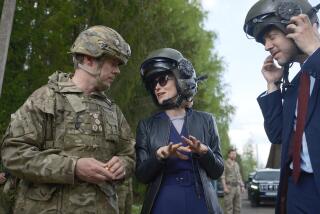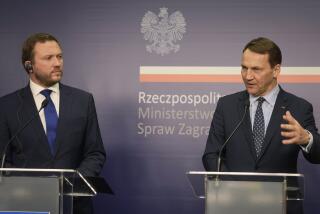Estonia Builds Army From Own Home-Grown Militia : Nationalism: Homeland summons retired U.S. Army colonel, names him chief of newborn Defense Forces.
- Share via
TALLINN, Estonia — After taking office last fall, Estonian President Lennart Meri was approached by officers of Kaitseliit, a 7,000-man paramilitary resistance force formed here in the final years of the Soviet Union’s half-century occupation.
With its bolt-action hunting rifles, Kaitseliit could be the backbone of Estonia’s new army, the officers told him. But we won’t take orders from anyone who served in the Soviet system.
Bowing to such sentiment and just as eager to erase a bitter imperial legacy, Meri summoned home Aleksander Einseln, the highest-ranking Estonian-born American citizen ever to serve in the U.S. military, and named him chief of the 18-month-old Estonian Defense Forces.
In May, after unanimous approval by Parliament, the 61-year-old retired Army colonel from Mountain View, Calif., became the first non-Soviet officer to command any of the 15 national forces carved from the Soviet military.
“His strength is that he’s been raised in the very best democratic tradition,” Meri said in an interview. “He’s never been brainwashed by a Soviet political commissar.”
Estonia is not alone in trying to rid its new army of Soviet and Russian influence. Most of Russia’s neighbors have welcomed native-son officers from far outposts of the old empire and looked beyond--to the United States, Europe and the Mideast--for training, hardware and security assistance.
After fleeing Estonia with his mother at age 12, Einseln spent 35 years in the U.S. Army, fighting in Korea and Vietnam and serving the Joint Chiefs of Staff as a specialist on Eastern Europe. Gen. H. Norman Schwarzkopf, of Desert Storm fame, was his classmate at the Command and General Staff College. But the only portrait on his office wall is that of Johan Laidoner, the Estonian army commander arrested and deported to Russia in 1940.
Einseln’s first order was to outlaw the Soviet tradition of brutally hazing younger conscripts. Then he restored the army uniform worn here before 1940, began acquiring North Atlantic Treaty Organization-compatible weapons from Israel and dispatched young officers to academies in Sweden, Finland and Germany.
On his introductory tour of army, navy and air force installations, Einseln made a point of calling on local governors and mayors and ordering his men to respect civilian authority.
From a chicken farm in Connecticut, he brought home Leon Reinsalu, 74, a veteran of the Estonian forces that resisted the Soviet takeover. Reinsalu was assigned to “jump over the 50 years” of occupation to help his chief reinstitute the best military traditions of Estonia’s past.
As Russia’s 7,000 remaining troops withdraw from this Vermont-sized nation, the Estonian commander must oversee removal of 2,000 sea mines and a nuclear reactor they left behind.
Soviet mentality will be harder to get rid of, he says. As he speaks to his soldiers about the new army, Einseln expects hands to go up, questions to pour out, as they would in America. “But they look at me like, well, do whatever you want. You say it, and it’s the word from Mt. Olympus.”
Most frustrating to Einseln, however, is the Clinton Administration’s attitude toward his appointment. Under U.S. law, it needed approval by the secretary of the Army and the secretary of state. The Army said OK; the State Department said no. Einseln took the job anyway, without salary, and now risks losing his U.S. citizenship and $50,000-a-year Army pension.
State Department spokesman Joe Snyder said the appointment went against efforts to promote “stability and mutual understanding among the nations of Eastern Europe and the former Soviet Union” but didn’t explain how. To Einseln, that sounds as if Russia objected.
“The only ones against me are the Russians in Moscow and the U.S. State Department; now that’s a hell of an alliance!” he said. “The United States is giving millions in credits to Russia. Why can’t it spare one over-the-hill colonel for poor little Estonia?”
More to Read
Sign up for Essential California
The most important California stories and recommendations in your inbox every morning.
You may occasionally receive promotional content from the Los Angeles Times.










